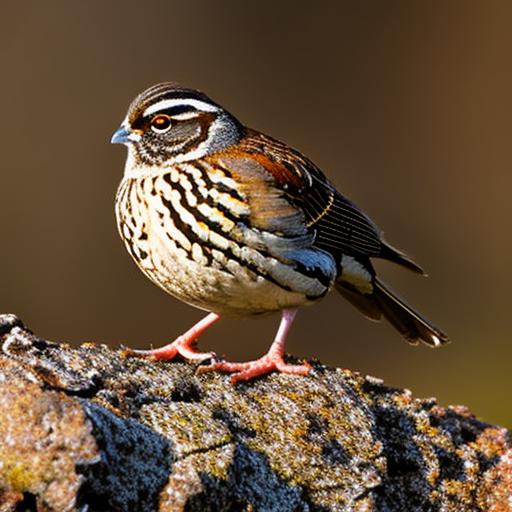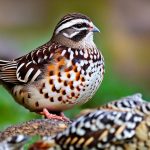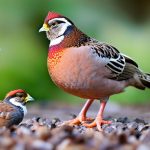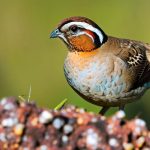When it comes to choosing the right quail species for your quail farm or backyard setup, there are several factors to consider. The most common quail species for farming and domestication are the Coturnix quail, also known as Japanese quail, and the Bobwhite quail. Coturnix quail are known for their fast growth rate, high egg production, and ease of care, making them a popular choice for beginners and experienced quail keepers alike. On the other hand, Bobwhite quail are native to North America and are known for their beautiful plumage and distinctive call. They are also popular for hunting and as pets due to their docile nature.
Coturnix quail come in a variety of colors, including standard brown, white, and tuxedo (a mix of white and brown feathers). Bobwhite quail, on the other hand, have a more distinct appearance with their striking black and white plumage. When choosing the right quail species for your setup, it’s important to consider your specific goals and needs. If you are looking for high egg production and fast growth, Coturnix quail may be the best choice for you. However, if you are interested in raising quail for hunting or as pets, Bobwhite quail may be a better fit. Ultimately, the right quail species for you will depend on your individual preferences and the purpose of your quail farm or setup.
Key Takeaways
- Choose the quail species that best suits your needs and environment, such as Coturnix for egg production or Bobwhite for meat.
- Set up a quail enclosure with proper flooring, lighting, ventilation, and nesting areas to ensure the birds’ comfort and safety.
- Provide a balanced diet for quail, including commercial feed, fresh water, and occasional treats like fruits and vegetables.
- Maintain quail health and hygiene by regularly cleaning the enclosure, monitoring for signs of illness, and providing necessary vaccinations.
- Manage quail breeding and egg production by controlling lighting and temperature to stimulate laying, collecting and storing eggs properly, and culling unproductive birds when necessary.
- Handle and tame quail by approaching them calmly, providing regular interaction, and using positive reinforcement to build trust.
- Troubleshoot common quail issues such as egg binding, aggression, and feather pecking by identifying the cause and implementing appropriate solutions.
Setting Up the Quail Enclosure
Setting up the right quail enclosure is crucial for the health and well-being of your quail. Whether you are raising quail for eggs, meat, or as pets, providing a safe and comfortable environment is essential. When it comes to the size of the enclosure, a good rule of thumb is to allow at least 1 square foot of space per quail. This means that a 4×4 foot enclosure can comfortably house around 16 quail. It’s important to provide enough space for your quail to move around freely and engage in natural behaviors such as dust bathing and foraging.
The flooring of the enclosure is another important consideration. Many quail keepers opt for wire flooring to prevent the buildup of waste and to allow for easy cleaning. However, it’s important to provide a solid surface or a mat for your quail to rest on to prevent foot injuries. Additionally, providing adequate ventilation and natural light is essential for the health of your quail. Consider adding windows or vents to the enclosure to ensure proper air circulation, and provide access to natural sunlight or full-spectrum lighting to support your quail’s overall well-being. Lastly, be sure to include nesting boxes or areas for your quail to lay their eggs, as well as perches or platforms for them to roost on. By setting up the right quail enclosure, you can create a safe and comfortable environment for your quail to thrive.
Providing the Right Diet for Quail
Providing the right diet is essential for the health and productivity of your quail. A well-balanced diet will support proper growth, egg production, and overall well-being. Quail are omnivorous birds and require a diet that includes a mix of protein, carbohydrates, vitamins, and minerals. A good quality commercial quail feed is a convenient option that provides all the essential nutrients your quail need. Look for a feed specifically formulated for quail that contains around 24-28% protein to support growth and egg production.
In addition to commercial feed, it’s important to supplement your quail’s diet with fresh greens, fruits, and vegetables. Leafy greens such as spinach, kale, and lettuce are excellent sources of vitamins and minerals for your quail. Fruits such as berries, melons, and apples can also be offered as treats in moderation. Additionally, providing access to grit or small stones is important for aiding in digestion, as quail do not have teeth and rely on grit to grind their food in their gizzards. Lastly, be sure to provide access to clean, fresh water at all times. Water is essential for digestion, egg production, and overall hydration. By providing a well-rounded diet that includes commercial feed, fresh greens, fruits, vegetables, and access to grit and water, you can ensure that your quail receive all the nutrients they need to thrive.
Maintaining Quail Health and Hygiene
Maintaining the health and hygiene of your quail is essential for preventing disease and ensuring their overall well-being. Regular health checks are important for monitoring the condition of your quail and catching any potential issues early on. Keep an eye out for signs of illness such as lethargy, loss of appetite, abnormal droppings, or respiratory issues. If you notice any concerning symptoms, it’s important to consult with a veterinarian who has experience with poultry.
In addition to regular health checks, maintaining proper hygiene in the quail enclosure is crucial for preventing the spread of disease. Keep the enclosure clean by regularly removing soiled bedding and waste, and disinfecting the area with a poultry-safe disinfectant. Providing clean water and regularly cleaning feeders and waterers will also help prevent the spread of bacteria and parasites. Additionally, practicing good biosecurity measures can help prevent the introduction of diseases to your quail flock. This includes limiting contact with other birds, quarantining new birds before introducing them to your existing flock, and preventing wild birds from coming into contact with your quail. By maintaining proper hygiene and practicing good biosecurity measures, you can help keep your quail healthy and disease-free.
Managing Quail Breeding and Egg Production
Managing quail breeding and egg production requires careful planning and attention to detail. If you are interested in breeding quail for egg production or expanding your flock, there are several key factors to consider. First, it’s important to ensure that you have a balanced ratio of males to females in your flock. A good rule of thumb is to have one male for every three to five females to prevent overbreeding and aggression among males.
Providing adequate nesting boxes or areas is essential for encouraging egg laying and ensuring the safety of the eggs. Be sure to provide dark, secluded nesting areas where your hens can lay their eggs in peace. Collecting eggs regularly will help prevent them from being damaged or eaten by other birds. Additionally, providing a diet that is high in protein will support healthy egg production in your hens. By managing breeding and egg production carefully and providing the right conditions for your quail to thrive, you can ensure a steady supply of fresh eggs from your flock.
Handling and Taming Quail
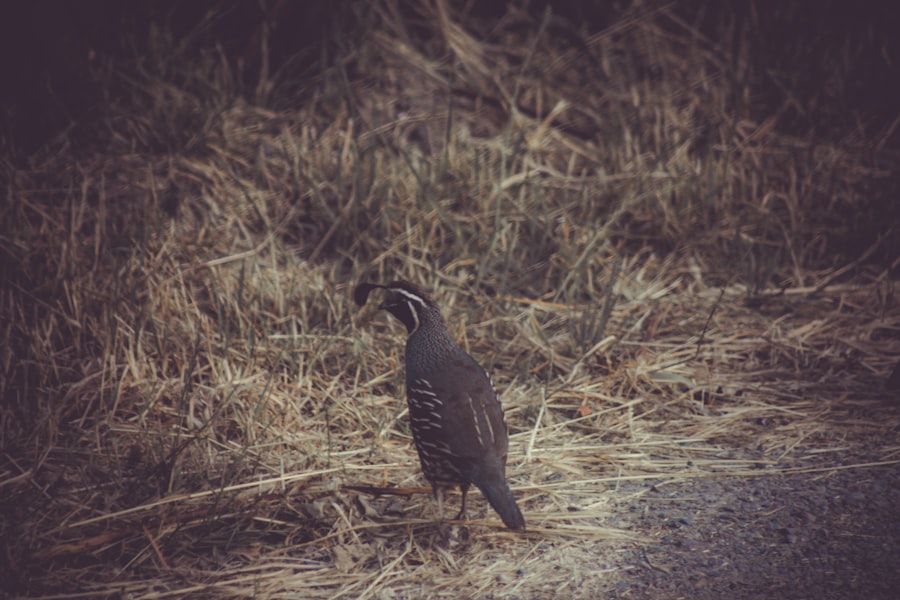
Handling and taming quail requires patience and gentle handling to build trust with these skittish birds. When handling quail, it’s important to approach them calmly and avoid making sudden movements that could startle them. Gently scoop them up from underneath using both hands to prevent them from flapping their wings or injuring themselves. It’s important to handle them regularly from a young age to help them become accustomed to human interaction.
Taming quail involves spending time with them regularly and offering treats such as mealworms or seeds from your hand. This will help them associate you with positive experiences and gradually become more comfortable around you. It’s important to be patient and consistent in your efforts to tame your quail, as it may take some time for them to become fully comfortable with human interaction. By handling and taming your quail with care and patience, you can build a trusting relationship with them and make it easier to care for them in the long run.
Troubleshooting Common Quail Issues
Despite your best efforts in caring for your quail, you may encounter common issues that require troubleshooting. One common issue is egg binding in hens, which occurs when an egg becomes stuck in the reproductive tract. Signs of egg binding include lethargy, straining, and vocalization from the hen. If you suspect that a hen is egg bound, it’s important to seek veterinary care immediately to prevent serious complications.
Another common issue is aggression among male quail. This can occur when there are too many males in relation to females or when there is limited space in the enclosure. Providing enough space and a balanced male-to-female ratio can help reduce aggression among males. Additionally, providing hiding spots such as plants or shelters can help reduce stress and aggression among your quail flock.
Mites and lice are another common issue that can affect quail. Regularly inspecting your birds for signs of mites or lice such as feather loss or irritation can help catch infestations early on. Treating the birds with a poultry-safe insecticide and thoroughly cleaning the enclosure can help eliminate mites and lice from your flock.
In conclusion, raising quail can be a rewarding experience when done with care and attention to their specific needs. By choosing the right species, setting up a suitable enclosure, providing a balanced diet, maintaining hygiene and health, managing breeding and egg production, handling and taming with patience, as well as troubleshooting common issues effectively, you can ensure that your quail thrive in your care. With proper management and dedication, you can enjoy the benefits of fresh eggs, meat production or simply the joy of keeping these fascinating birds as pets.
If you’re interested in keeping quail, you may also want to consider the housing options for your birds. A well-designed coop is essential for their safety and well-being. Poultry Wizard offers a comprehensive guide on building an A-frame chicken coop, which can be easily adapted for quail housing as well. Check out their article on A-Frame Chicken Coop to learn more about creating a suitable and secure living space for your quail.
FAQs
What are the benefits of keeping quail?
Quail are a great source of protein and can provide eggs and meat for consumption. They are also relatively easy to care for and require less space compared to other poultry.
What do quail eat?
Quail are omnivores and eat a diet of seeds, grains, insects, and small invertebrates. They can also be fed commercial quail feed.
How much space do quail need?
Quail require about 1 square foot of space per bird in a coop or cage. They also need access to an outdoor area for foraging.
What are the housing requirements for quail?
Quail housing should provide protection from predators and the elements. It should also have proper ventilation and be easy to clean.
How do you care for quail chicks?
Quail chicks need to be kept warm and dry, and provided with a diet of high-protein chick starter feed. They also need access to clean water.
What are some common health issues for quail?
Common health issues for quail include respiratory infections, parasites, and injuries from pecking or fighting. It’s important to monitor the health of quail and seek veterinary care when necessary.
Can quail be kept with other poultry?
Quail can be kept with other poultry, but it’s important to provide separate housing and ensure that the quail are not bullied or injured by larger birds.
How do you handle quail eggs?
Quail eggs should be handled with care to avoid breakage. They can be stored in the refrigerator and used in the same way as chicken eggs.
Meet Walter, the feathered-friend fanatic of Florida! Nestled in the sunshine state, Walter struts through life with his feathered companions, clucking his way to happiness. With a coop that’s fancier than a five-star hotel, he’s the Don Juan of the chicken world. When he’s not teaching his hens to do the cha-cha, you’ll find him in a heated debate with his prized rooster, Sir Clucks-a-Lot. Walter’s poultry passion is no yolk; he’s the sunny-side-up guy you never knew you needed in your flock of friends!

